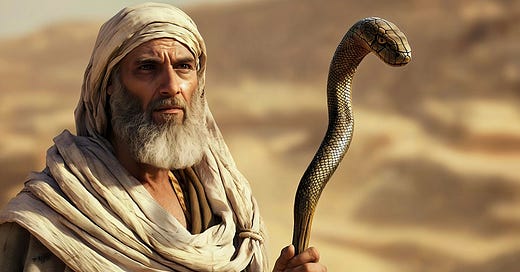“But Moses protested again, “What if they won’t believe me or listen to me? What if they say, the Lord never appeared to you?” Exodus 4:1
“You can take the Jew out of the exile, but you can’t take the exile out of the Jew.” Joseph Trumpeldor [2]
Moses was well educated and smart, right? Probably, but with a dash of klutz and a dollop of dullard thrown in. He is now on his third protest, another reason why he could not fulfill the assignment. Could it possibly be that he was clever, pushing God to the limit to get all the advantages he could? Moses’ protest was not fear of the Israelites, not fear of failure, but fear of success. Moses was stalling for time! Rarely are we honest enough with ourselves to be honest with God.
I can’t seem to get to the place of talking straight up with God and holding nothing back. I can’t get free of thinking I am talking or negotiating with a brilliant superior who can’t possibly know everything I am thinking, feeling, or orchestrating. One of modern history’s smartest Jews and greatest negotiators, Henry Kissinger, didn’t and wouldn’t have a chance against God. That could explain why, in his skepticism, he never tried. We can’t comprehend that we are speaking with a being who lives in a simultaneous reality outside of time and space. A being who didn’t say “I was” or “I will be” but insisted on naming himself “I Am!” Someone who sees the finished painting outside of time, while we are still painting in time. One who has sorted it all out and even written it down, who is putting us in the right place at the right time, and who has given us the right tools to fulfill the assignment. Moses is doing his best to get out of the job. He’s not holding out for more money—he is satisfied with mediocrity. It’s warm and comforting like an old sweater with matching house shoes.
Moses had his chance, he had opportunities—being chosen by God himself, thinking of a return to glory, he could see the bright lights of Broadway—but he wanted the life of a recluse. Alas, he would lose the battle for a solitary life, like Aleksandr Solzhenitsyn, who won the Nobel Prize, and Mother Russia calling him back. Moses was destined to be stripped of his clever manipulation and thrown onto history’s front page. His charade ended when God asked a question that Moses could not have anticipated. Look through the scriptures; God asks seemingly strange questions.
“Then the Lord asked him, “What is that in your hand?”
Moses looked at his hand, “A shepherd’s staff,” he answered. Moses is immediately off his game. He doesn’t know where this is going. God is toying with him, making fun. Possibly he is thinking, “Hey Lord, that is what I do, you know me, you see me. I’m a shepherd, that’s my staff.” Unlike the modern Bishop with a staff that has no practical purpose, for Moses, his hand held a staff for protecting the flock. God doesn’t waste words: “Throw it on the ground.” Moses obeyed, and instantly it became a snake, and Moses jumped back. This is what most humans do: run away from snakes. Startled, Moses, shoeless and out of breath, hopes that there is no way it could get worse.
Then God starts having some fun. Isn’t God allowed to have fun when making a point? “Pick it up Moses, reach out and grab it by the tail.” A stunned Moses pulls it together and picks up the snake by the tail. We can imagine what happens when a snake is picked up by the tail. I have never picked up a live snake, not even a dead one. It can be dangerous to hold a reptile that instinctively fights to survive. But suddenly, it became a staff again, right there in his hand! It’s more frightening than the actual snake. He must have wondered, “Did that really happen?” I have a friend who is so good at card tricks that when he performed one at a home Bible study, one member was so spooked he ran out of the house and never came back.
Game, set, match
God then clears his throat and clarifies, “Perform this sign, the Lord told him. Then they will believe that the Lord, the God of their ancestors—the God of Abraham, the God of Isaac, and the God of Jacob—really has appeared to you.” This would seem to be more than mere evidence, but actual proof that Moses had nothing to fear. But the words that would have frozen me in my tracks are: “Perform this sign.” This means, if the English translators are worth their pay, Moses will need to duplicate this snake trick for the Elders of Israel. I imagine myself in his place. They have never had a magician who could perform a miracle, a feat that defies human explanation. What if they say, “Ok, go ahead, you do the trick.” I see myself bumbling my way through it, forgetting this or that. I have practiced it for days until I got it right. It’s hard enough when your wife teaches you to load the dishwasher with the cups upside down instead of right side up, or open a can of soup that has only one end that opens, but reptilian manipulation is another level.
I’m just guessing at this point, but God sees the look on Moses’ face and decides, ok, let me give you another sign. God instructs Moses to put his hand inside his coat and pull it out again. Voilà,[3] it turns white and leprous. Then he puts his hand back in his coat, and it comes out normal.
God sums up the case for Moses. “If they do not believe you and are not convinced by the first miraculous sign, they will be convinced by the second sign. Moses seems a bit more optimistic, but God doesn’t want to create another counseling session with Moses, so he goes a bit further:
“… If they don’t believe the first two signs (they are stubborn Hebrews, [4] you know), take some water from the Nile River and pour it out on the dry ground. When you do, the water from the Nile will turn to blood on the ground.” Exodus 4:9
Convincing the skeptics
Moses is armed with three miraculous weapons, evidence that demands a verdict on the part of the Israeli elders. Moses will need to be convinced, but he does show some signs of moving forward with God on this project. The Elders will need to be convinced, the people will need to be convinced, and then there is Pharaoh, his elders, his army, his people, and public opinion. Moses has been living the quiet life on the back side of the Negev for forty years, and it all seems surreal, a dream, a nightmare, more than a mission. It seems like a suicide mission.
Calling is a work in progress
When someone tells you they received a call from God and it was clear, cut and dried, and they never doubted, give them a saliva test.[5] In other words, a real person would not be as robotic, not as mechanical, because real people have problems, doubts, and fears. When God initiates a conversation with a human, it will be by necessity, ongoing, as we humans continually need reminders to keep us going.
God grows impatient with Moses, who is putting up a fight. He’s been famous, he’s been rich, he’s been the center of attention, and he doesn’t like this new job. All his needs are met, he’s highly respected among his adopted tribe, he will inherit great wealth in due course, and best of all, he is alive. He likes anonymity; it suits him. Comfort is appealing, especially if you have forgotten the thrill of adventure. The most common thing in the world is to be common. The Anglican Communion prayer book is called the Book of Common Prayer. The British people are ruled by the House of Commons. Common is what most people like because it is safe, you don’t stick out, and you are at low risk.
But there are times when being uncommon is essential. Winston Churchill was an uncommon man for uncommon times. His words reminded the people of Britain of their glory and heritage. His eloquence called the courage from the people’s hearts, their breasts swelled with pride and determination and they fought off the Nazis, because that was what was needed, they had to reach deep, but when they reached for it, it was there.
Moses was being called upon to deliver a message and to lead a nation out of defeat, misery, and slavery. God provided him with the tools needed. But don’t be deceived, there would come plagues, confrontations, rebellions, highs, lows, mistakes, and tragic results. Moses’ story is complex and multifaceted, recorded in books such as Exodus, Numbers, Deuteronomy, and the book of worship in Leviticus. It went on for forty more years and God was with him all the way. And then, with respect, God buried his servant on Mt. Nebo.
What is it that is in your hand?
You are reading this, and the question God is asking you to illuminate your mind and fill your spirit is an ancient one: “What is that in your hand?” What common thing best identifies you, how do people see you, and what are you good at? God has a reason for asking such a question. You know what is coming next: “Throw it on the ground,” and it becomes something supernatural, it comes to life, it is powerful, and you want to run from it. But you must go pick it up, because then it becomes that staff that you, like Moses, turn the Nile into blood, that opens the Red Sea, and takes you forward in making disciples through who you are and what you do. It will also be the tool you use in anger to strike the rock and show your lack of trust in God. God isn’t asking for you to stretch your 18-hour day into a 20-hour day. He seeks to animate and bring to life the gifts and skills you already have to reach others. And he plans to do this within the limits that are inherent in the human experience. All he needs from you is the go-ahead, your consent, your obedience. And as God told Moses, “And take your shepherd’s staff with you, and use it to perform the miraculous signs I have shown you.”
Bill Hull
[1] Oy Vey, Yiddish for woe is me, is a common, even comic expression meaning I am stuck, this is my reality, no way out, etc.
[2] David Mamet, Recessional, (New York, Broadside Books 2022) “On the Passivity of Jews,” pages 57-59.
[3] Voilà is French for behold.
[4] Please fill in your name in the place of “Hebrews.”
[5] Saliva test reference has a long history. In the 1950s, it was commonly used to check and see if a person was conscious and aware of their surroundings. Something like, are you paying attention, are you dialed into life? In modern times, it is the swab used to determine infectious disease. Even more people today swab their mouths for knowledge of their ancestry.
New book available at Amazon in paperback, digital, and audible




